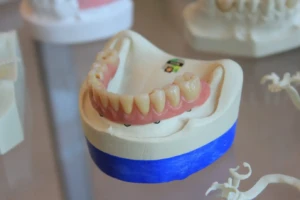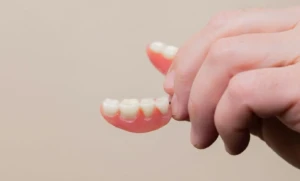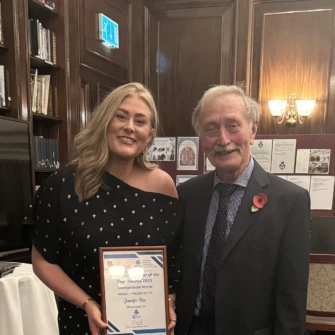What to Expect During Your Denture Fitting Journey
Published: 29 July 2025
While many of us likely have a mental image of what dentures are like, denture technology has made significant advancements in recent years and is worth considering when seeking a solution for missing teeth.
These advancements have transformed dentures from what was often perceived as cumbersome and inconvenient into a worthy replacement for a natural smile, thanks to more realistic appearances, increased durability, and a more comfortable fit.
So, how do they work, and what can you expect from your denture fitting journey?
What are dentures?
Dentures have been made from many different materials throughout history. With the oldest example of dentures traced back over 2000 years, people have made do with materials such as wood, bone, animal teeth, and even the teeth of other human beings!
Fortunately, denture technology has developed substantially since then, and today, the majority of dentures are composed of acrylic, resin, or metal.
As one might expect, dentures feel different from a natural bite; however, they can help alleviate many ailments caused by tooth loss.
Dentures can assist in preventing speech impairment, averting changes to appearance, improving chewing and biting, and, in some cases, maintaining jawbone structure.
Who are dentures for?
Although popular culture might suggest that dentures are solely for the elderly, in reality, they are suitable for anyone with missing teeth.
Despite other solutions being available, including bridges, crowns, and implants, dentures offer a cost-effective and convenient option with minimal discomfort.
Although dentures are widely available privately, they can also be accessed through the NHS in certain circumstances. Our website offers additional information about the treatment options available to Clyde Munro patients at a variety of practices across Scotland.
Different types of dentures & how they are fitted
Whether you have a few teeth missing or need a solution that entirely replaces your natural smile, dentures can offer an effective option at a reasonable price.
To find the option that’s right for your needs, we examine the available solutions and how they’re fit.
Complete dentures
First on the list are complete dentures.
Designed to replace all upper and/or lower teeth, complete (or full) dentures can make an incredible difference for those struggling to chew food, whilst improving speech and their smile.
If you do not require any extractions before fitting, complete dentures can be fitted in a non-invasive manner with minimal discomfort.

First, the dentist will take an impression or a digital scan of the arch, which is then passed on to a dental technician.
From there, the technician can create a custom denture that perfectly matches your mouth shape, ensuring that your smile looks and feels natural and that your bite is comfortable. This can take a number of appointments to achieve the end result.
Complete dentures are also easily removable for cleaning and overnight removal.
While these dentures are designed to be custom-fitted to your mouth, adhesive may sometimes be necessary.
This is particularly true in cases where more strenuous chewing is required or bone shrinkage has occurred.
After having your dentures fitted, you can expect them to last between 5-10 years with proper care. However, it is advisable to visit your dentist once a year to ensure that your dentures fit correctly and so the soft tissues in your mouth can be checked carefully.
Partial dentures
Designed to replace a few missing teeth, partial dentures offer a cost-effective and painless solution that can greatly benefit your smile, jaw, and remaining teeth.
Basic dentures can be constructed from a framework of acrylic and wire clasps around your remaining teeth. In some circumstances, partial dentures occupy the gaps left by missing teeth.
Similar to complete dentures, partial dentures can be easily removed for cleaning.

When fitting partial dentures, you can expect a process similar to that of fitting complete dentures, where a scan or impression of your teeth is taken. A dental technician will then create your partial denture before sending it to your dentist for fitting. Again, this can take a number of appointments
With proper care, partial dentures can be expected to last for up to 15 years.
Partial dentures can also be made with a variety of materials. Chrome metal framework and flexible dentures are also possible in certain circumstances.
Implant-retained dentures
While dentures are generally considered secure and practical, if you have any concerns about this, you may prefer to opt for implant-retained dentures.
Although more costly than traditional dentures, implant-retained dentures eliminate the need for adhesive and enhance denture retention with minimal discomfort.
Following a comprehensive assessment and scan to assess the implant’s intended position, the dentist will administer an anaesthetic to the area before placing the implant in your jawbone. The implant will then fuse with the jawbone over the course of a few months.
Once healed, these implants provide excellent retention for dentures, enhancing both confidence and comfort when speaking and chewing.
While titanium implants can be long-lasting with proper care, the denture itself has a lifespan akin to that of a traditional complete denture, lasting approximately 10 years.
Dental check-ups are recommended at least once a year for optimal results.
Temporary dentures
In each of the above instances, a waiting period of several weeks is required while the denture is constructed (and in the case of implant-retained dentures, while the implant heals). During this time, temporary dentures will be provided.
Although not as comfortable as custom dentures, these dentures can offer an effective temporary solution and can be made prior to extraction to minimise disruption to daily routines.
Choose Clyde Munro
We hope this blog has provided you with the information you’re looking for, allowing you to feel confident when choosing dentures.
If you have any further questions about dentures, please don’t hesitate to contact your nearest Clyde Munro practice. All of our dentists will be pleased to explain the process in any additional detail you may require.





